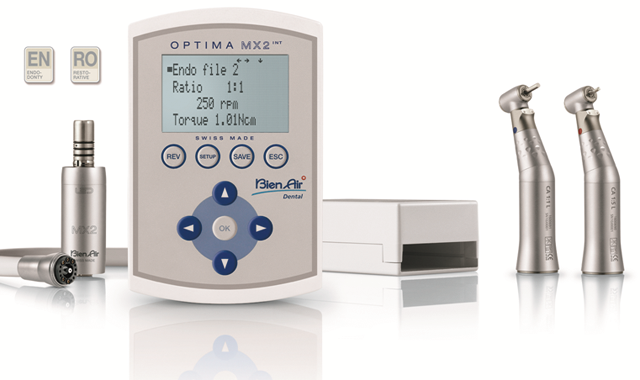Using Bien-Air’s latest micromotor, the MX2 brushless
Bien-Air’s latest micromotor, the MX2 brushless, is shorter and lighter, but according to this dentist, every bit as robust, stable, and consistent as it’s predecessor the MX

Time is money in a dental office. Bien-Air has always looked for ways to provide top quality equipment that helps clinicians meet their potential for both exemplary patient care and practice management.
Their latest Micro-Series Instruments, the MX2 brushless micromotor is no exception. Here Dr. Matthew Nejad, a graduate of the acclaimed University of Southern California School of Dentistry who has been practicing since 2010, explains how using Bien-Air handpieces helps him in his California practice.
What Dr. Nejad, DDS, had to say about the MX2 LED Micromotor
I switched to electric handpieces in school. I liked them so much that when I started practicing, I invested in electrics right off the bat. Two years ago, my partners and I bought a new practice. I started using the MX2 in the new office. I was happy with my previous handpiece, but these were so much better than the one I was using.
Related reading: 5 reasons to consider an air-driven handpiece
What do you like best?
It was much smoother and had more torque and power. It would never slow down. You couldn’t stop it, whereas my other handpiece had been uncertain on materials like zirconia.
The water spray is another one of my favorite things. It’s consistent. You get four different water ports which operate perfectly whether you want high- or low-water cooling. My experience with my other electric handpieces is less impressive. The water ports do not consistently work and many times only one port would operate when the water level is turned down low.
The touchpad is a great part of it, too, because you can program so many different settings and have your favorites stored on it. Some of the other ones just have a couple of memory options, like the one I had. But with the programming on the MX2, I can have my settings, and my partners can have their settings.
For more on handpieces: Category Cruncher: Handpieces
What have been the results and patient responses?
Patients noticed the sound difference. It’s quieter. It doesn’t have that whistling sound. Also, the fine control results in more precise margin finishing. It’s easy to run at a lower speed to finesse the margin, and that is something that is difficult with an air turbine. You don’t have to feather to rheostat or compensate for low torque when you are using an electric handpiece. It’s simple and I like that. My lab and I benefit from better preparations and patients are happier about a smoother and less noisy appointment.
What benefits to the practice have you experienced?
The electric handpiece has made my dentistry more predictable and more enjoyable. It’s something I use all day, every day. I love that I am using the best tool, and it allows me to do my best work.
The number one benefit for me is the improvement in my restorations and preparations. I am able to do better preparations and restorations with the control the electric handpiece provides. As a result, my restorations look better, and the number of restorations that we have to send back due to any issue is almost non-existent.
On top of that, it speeds up the average appointment by 10 or 15 percent, especially when you’re cutting through certain materials, like zirconia or IPS e.max. They’re both incredibly hard to cut period, but with the electric, you can control that better and cut through it and keep at it with a high torque. It can help speed that up. This combined with the time I save in finishing my preparation margins results in significant additional time I can use to treat patients every day.
Why would you recommend this product to your colleagues?
It’s fantastic because of the smoothness, the options, the reliability, price points. I mean, there’s really no downside to it, and that’s what’s been the most amazing thing to me. You just have to spend a little more right up front. But with that, you’re getting so many better options that I think long-term, you’re going to get much more use and ease of use out of it.
Bien-Air MX2 LED Micromotor
The latest from Bien-Air’s micromotor series, the MX2 LED brushless micromotor is exceptionally stable and powerful. The MX2 is effective at low speeds (as low as 100 rpm), due to the Smart-Logic electronic control. The unit is also 30% shorter and 23% lighter when used with the new Bien-Air Micro-Series Instruments. Because the MX2 is equipped with lifetime-lubricated ball bearings, you can sterilize it and still be maintenance free. Following in the footsteps of its famous predecessor the MX, the new MX2 also delivers consistent power, speed, torque and reversal of the direction of rotation. The MX2 brushless micromotor is unparalleled in both comfort and balance for today’s clinician. For more information on Bien-Air products, visit bien-air.com.
ACTIVA BioACTIVE Bulk Flow Marks Pulpdent’s First Major Product Release in 4 Years
December 12th 2024Next-generation bulk-fill dental restorative raises the standard of care for bulk-fill procedures by providing natural remineralization support, while also overcoming current bulk-fill limitations.